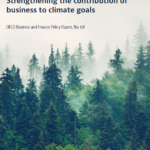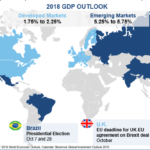A 2015 survey of millennials around the world found that growing economic and social inequalities were their top concern. And it isn’t only millennials: The JUST Capital Roadmap for Corporate America has found for three years in a row that the number one public concern of corporate behavior of persons of all ages, income levels, and political parties is worker treatment, including fair wages and non-discrimination.
Rising social and economic inequalities have consistently been ranked among the top systemic global risks in the annual WEF Global Risk Index. In fact, growing inequalities have been linked to social issues from higher rates of cancer to higher rates of joining terrorist groups.
Inclusive growth is growth that reduces, rather than exacerbates, these inequalities. The Organization for Economic Cooperation and Development (OECD) defines it as, “economic growth that creates opportunity for all segments of the population and distributes the dividends of increased prosperity, both in monetary and non-monetary terms, fairly across society.” The degree to which growth is inclusive has direct effects on a business, including by increasing the purchasing power of its consumers, increasing its potential employee base, and providing a stable operating environment for its operations.
Deloitte found in a recent survey that a majority of business leaders are supportive of changing their corporate practices to foster more inclusive growth. They believe this can feed innovation, strengthen resilience, and contribute overall to their competitiveness. However, the largest barrier business leaders say they face is a perceived lack of support from investors.
The investment community is interested in being part of the solution. We’ll be discussing what this can look like at the RI Europe 2018 conference in London this week.
How can responsible investors help foster inclusive growth?
1. Create and Collect Metrics on Inequality
One of the most challenging aspects of this for investors is a lack of clear definitions and metrics on which business actions contribute to inclusive growth. To date, responsible investors have focused on rising inequalities by measuring CEO-average worker pay ratios. While they are an important indicator, they are only one aspect of this multidimensional problem.
The Morgan Stanley Institute for Sustainable Investing, together with BSR, developed a comprehensive framework to map business actions that drive inclusive growth. In our research, we found that nearly every department inside a company makes choices that can impact inclusive growth. These include decisions in human resources like whether internships are paid; whether or not to pay contingent workers living wages with benefits, job security, and paid training; and how to remove bias in hiring and promotion algorithms. Yet how companies price their products and how companies engage more broadly with society through advertising, tax practices, and lobbying efforts on issues like the minimum wage, paid leave, tax, and immigration are also a part of the picture that needs to be assessed.
Investors can leverage this framework, and they can also advocate for more comprehensive collection of inclusive growth metrics and universal data collection approaches, such as the Social and Human Capital Protocol. They can encourage their portfolio companies to disclose their human capital activities through signing the Workforce Disclosure Initiative and supporting broader disclosure of public policy advocacy efforts.
2. Participate in Building a Global Action Agenda on Inclusive Growth
Meaningful progress on a global challenge like inclusive growth will require collaboration by stakeholders across society, including investors.
The climate change movement in the run-up to the adoption of the Paris Agreement serves as a successful model for how this coordinated action can be achieved. Specifically, the international climate consensus was possible thanks to the articulation of leaders to inspire coordinated action and commitment. Investors played a role not only in encouraging action in the run-up to the negotiations, but also in encouraging countries to continue to drive implementation since adoption.
Discussions are beginning to take place at the multilateral level on how to tackle the challenges of growing inequalities, and the investor voice will be important in these conversations. One way that investors can participate is through the OECD Business Leaders for Inclusive Growth project, which aims to align private and public sector efforts to achieve inclusive growth.
Achieving and sustaining inclusive growth is both a significant challenge and an opportunity for all of us, and investors can play a huge role in our collective solution.
Président et Cofondateur. Auteur de différents ouvrages sur les questions de RSE et développement durable. Expert international reconnu, Farid Baddache travaille à l’intégration des questions de droits de l’Homme et de climat comme leviers de résilience et de compétitivité des entreprises. Restez connectés avec Farid Baddache sur Twitter @Fbaddache.






























































































































































